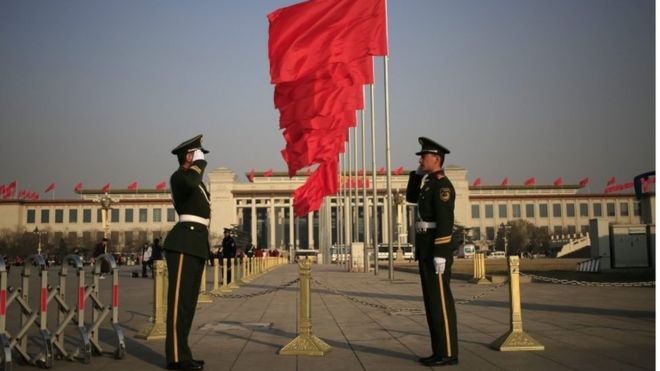China 'training for strikes' on US targets
China's military "is likely training for strikes" against US and allied targets in the Pacific, a Pentagon report warns.
The annual report to Congress says China is increasing its ability to send bomber planes further afield. The report highlights its increasing military capability, including defence spending estimated at $190bn (£150bn) - a third that of the US.
China has not yet commented on the report.
"Over the last three years, the PLA [People's Liberation Army] has rapidly expanded its overwater bomber operating areas, gaining experience in critical maritime regions and likely training for strikes against US and allied targets," the report says.
It goes on to say it is not clear what China is trying to prove by such flights.
The People's Liberation Army may demonstrate the "capability to strike US and allied forces and military bases in the western Pacific Ocean, including Guam," the report adds.
China, it says, is transforming its ground forces to "fight and win."
"The purpose of these reforms is to create a more mobile, modular, lethal ground force capable of being the core of joint operations," the report says.
The document also warns that China "is likely preparing for a contingency to unify Taiwan with China by force".
"Should the United States intervene, China would try to delay effective intervention and seek victory in a high-intensity, limited war of short duration," the report says.
China sees Taiwan as a renegade province.
Though the US and China have contact between military officials to defuse tensions, the report comes at a time of continuing friction.
The US regularly seeks to demonstrate freedom of navigation with flights over the South China Sea, much of which is claimed by China, and a number of other nations.
China has been expanding what appear to be military facilities on islands in the South China Sea and has landed bombers on the outposts during training exercises.
The US also continues to maintain a substantial military presence in Japan.
Despite tensions, in June, James Mattis became the first US defence secretary to visit China since 2014.
The Pentagon report says it expects China's military budget to expand to $240bn over the next 10 years.
It also highlights China's growing space programme "despite its public stance against the militarization of space".
Tensions also continue in the non-military sphere. Starting with the US, which objects to its growing trade deficit with China, both sides have announced tariffs on a range of each others' goods.


Comments
Post a Comment